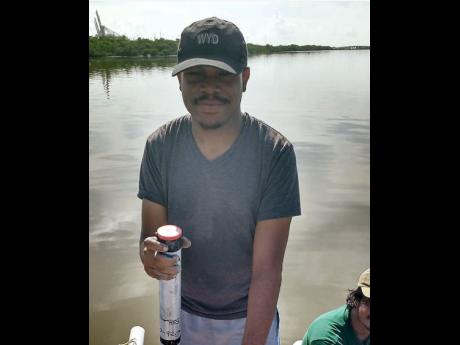Kadane Coates: Palaeoclimatologist in the making
PROSPECT, St Thomas:
Steadfast on the journey to becoming one of possibly three palaeoclimatologists in Jamaica, taking into account his lecturer and one other classmate, is Kadane Coates of Prospect in St Thomas.
The 25-year-old explained that palaeoclimatology is the study of past climate, typically without the use of instrumental records, and that instead of instruments, palaeoclimatologists rely on well-preserved geological records such as sediments, ice cores and corals, which chronicle past climatic events and conditions over centennial-millennial timescales.
Coates, who is a past student of the Morant Bay High School, completed a bachelor of science degree in food chemistry some three years ago and is almost done with his master of philosophy degree in chemistry, during which he assists students in lab-based courses and helps them to hone their experimental skills.
"My MPhil project is focused on understanding past environmental changes in Hunts Bay over the past 150 years using retrieved sediment cores. One part of the project involves assessing the drivers (causes) of environmental change, and one of these happens to be climate. After completing my MPhil in chemistry, I intend to pursue a PhD in geochemistry or palaeoclimatology," he said, adding that currently, and to the best of his knowledge, there is only one palaeoclimatologist in Jamaica, his thesis co-supervisor, Dr Michael Burn.
The young scientist, who has been working overtime to perfect his craft, told The Gleaner that his love for chemistry was birthed back in high school.
According to him, "In third form, I wanted to prove something to myself, that I could do anything I put my mind to, and it helped that I had an amazing chemistry teacher, Mr Watson, who loved what he did and who wanted us to excel."
Passion teamed up with purpose, when Coates was introduced to a plethora of information as told by a piece of rock or a particle of dirt about things which happenings way before his time, and of course, the amount of chemistry that is involved.
Now fully on the journey of a less-trodden road and hoping to discover the possibility of restoring the marine environment of Kingston Harbour to its original state, Coates asserted that Jamaica and the region need more scientists and research in his field.
He said, "There are many questions that need to be answered concerning environmental management and protecting our natural resources. This is even more pertinent because we are currently living in climate that is approaching a major tipping point, and if we cross that point it, could spell disaster for small-island developing states such as Jamaica. Palaeoenvironmental research holds valuable keys to what we might expect to see if this unfortunately were to happen. This is pivotal in helping us to mitigate against the negative consequences of climate change. Also, we need more palaeoenvironmental scientists to inform policy and legislation concerning the environment and the protection of our natural resources."


